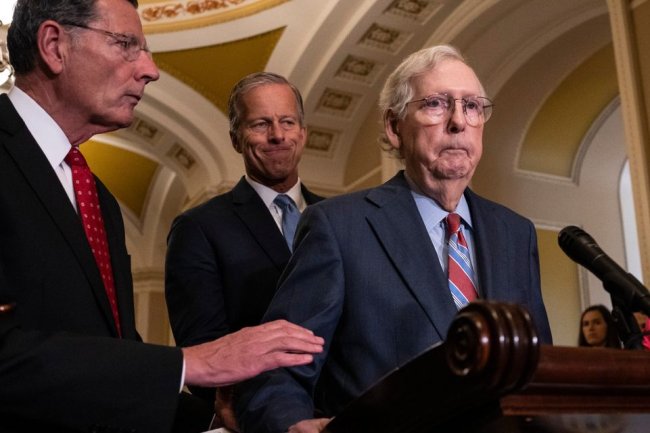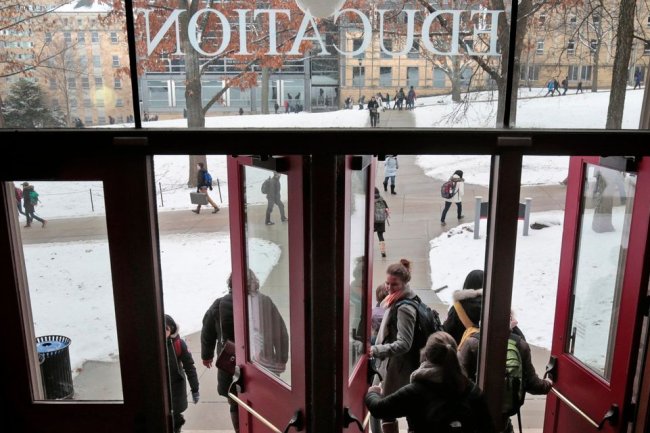An Electric-Vehicle Payoff for the UAW . . .
Biden admits his EV transition will cost jobs. Solution: More subsidies. By The Editorial Board Sept. 1, 2023 6:43 pm ET Signage at the Hyundai Electric Vehicle (EV) and battery manufacturing metaplant facility under construction in Ellabell, Ga.in April. Photo: Elijah Nouvelage/Bloomberg News If step one of Bidenomics is funneling cash to green industries, step two is cleaning up the distortions created by its subsidies and mandates. That explains the President’s plan this week to spend billions to prop up union jobs in electric-car production that the government is forcing on auto makers. Just in time for Labor


Signage at the Hyundai Electric Vehicle (EV) and battery manufacturing metaplant facility under construction in Ellabell, Ga.in April.
Photo: Elijah Nouvelage/Bloomberg News
If step one of Bidenomics is funneling cash to green industries, step two is cleaning up the distortions created by its subsidies and mandates. That explains the President’s plan this week to spend billions to prop up union jobs in electric-car production that the government is forcing on auto makers.
Just in time for Labor Day, the White House said Thursday that it will offer $12 billion to help auto companies retool their plants for electric vehicles. Car makers planning to build more EVs can apply for loans and grants from the Energy Department, but the scoring system comes with a Big Labor catch. The program gives preference to “projects that are likely to retain collective bargaining agreements.”
This is a de facto admission that Mr. Biden’s much-heralded EV transition will cost more jobs than it creates. It’s also a subsidy for union jobs that might otherwise be lost in the transition to EVs. The Bureau of Labor Statistics predicts that EV assembly jobs will grow by more than 17% in the coming decade.
But each EV can be built with about 30% fewer workers than a gas-powered car, and many new plants are opening in such right-to-work states as Tennessee and Georgia and are currently union-free. Union jobs will also be lost in gas-powered auto assembly, as the companies make fewer to meet federal and California EV mandates. Auto suppliers, many of which are unionized, could also lose jobs because EVs use fewer parts.
The $12 billion comes in addition to the subsidies already flowing to EV production. The Inflation Reduction Act includes $393 billion in clean vehicle tax credits by 2032, according to the Penn Wharton Budget Model, along with incentives in related areas like battery manufacturing. Even with the subsidies, it isn’t clear that consumers would choose EVs over cheaper gas-powered cars and trucks.
The United Auto Workers (UAW) celebrated the EV subsidies when the law passed last year, but the union failed to convince Democrats to attach a provision to limit tax breaks to union-made cars. The new $12 billion payoff is intended to make up for that failure without having a vote in Congress.
The new subsidy is also intended to strengthen the UAW’s hand in its current contract negotiations with the Big Three auto makers. The union’s top goal is to maintain and expand dominance in the EV plants that will make up a big share of the future auto workforce.
Auto makers will have to pay to avoid a strike. The current contracts expire Sept. 14, and UAW members have approved a work stoppage if no deal is reached. Ford publicized its offer on Thursday, which includes a 15% bump in compensation over four years plus cost-of-living adjustments.
The UAW wants a 40% increase over four years, as well as guarantees on EV jobs. The $12 billion is supposed to induce GM, Ford and Stellantis to give the union what it wants. But union labor could make Detroit less competitive with Tesla
and foreign EV makers.The EV issue ranks so high among the union’s priorities that it has withheld its endorsement for Mr. Biden’s re-election. “We want to see national leadership have our back on this before we make any commitments,” said UAW president Shawn Fain in May. Mr. Fain applauded the subsidies Thursday.
If auto makers leap at the new money, the cost will fall on the companies and taxpayers. Nudging investment toward more costly production will inflate the cost of EVs, and the companies will end up taking bigger losses. As usual with Bidenomics, one bad subsidy begets another, and the offer is pay more, get less.
Journal Editorial Report: The electric-vehicle bubble starts to deflate. Image: Jae C. Hong/Associated Press The Wall Street Journal Interactive Edition
What's Your Reaction?




















